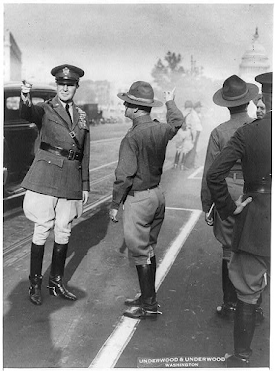Summer seems to be a prime time for protests, especially in Washington, D.C. Perhaps because of vacations, when people are free to travel, yet Congress is still in session. There have been civil rights marches, March for Life events, and huge prayer rallies.I learned recently about the Bonus Army march of 1932, one of the first large scale, veteran-led, organized protests in American history, which set the standard for non-violent advocacy.
 |
| Bonus Army marching toward the Capitol on July 5, 1932. Library of Congress photo |
Veterans of the Great War (now known as World War I) had been promised bonuses, or “adjusted compensation,” for their service. In 1924, Congress approved giving each qualified veteran an additional $1 for every day served; for overseas service, the amount was $1.25. Certificates were issued which could be redeemed for the bonus amount with compound interest in 1945.
But when the Great Depression hit, many veterans struggled to make ends meet. Unemployment rose to more than 20%. Over a quarter million families lost their homes to mortgage foreclosure.
Veterans needed cash, not paper certificates promising a future payout.
In 1932, Congress considered a bill for early payment of the bonuses, sparking hope among veterans. Originating in Portland, Oregon, several hundred veterans began to travel to the nation’s capital to urge passage of the bill. By early summer, nearly 20,000 jobless veterans from all over the country, along with their families and supporters, joined. Called the Bonus Expeditionary Force, an allusion to the war’s American Expeditionary Force, the press nicknamed it the Bonus Army.
 |
| Bonus Expeditionary Force camp on Anacostia Flats had a military-style organization. Library of Congress Photo |
Disappointed, the veterans sang “America” and returned peacefully to their camps, vowing to stay until their situation improved. One veteran said, “If they gave me a job, I wouldn’t care about the bonus.”
The movement’s leader, Walter W. Waters, urged non-violent protest. As the summer progressed, however, skirmishes with police occurred and officials grew concerned about public order. On July 28, skirmishes turned into a brawl and two vets were wounded and later died. President Herbert Hoover then ordered the Army to “put an end to rioting and defiance of authority.”
 |
| General Douglas MacArthur directing the evacuation of Bonus Army marchers from Washington, D.C. July 28, 1932. Library of Congress photo |
Images of veterans and their families under attack by their own government shocked the nation. The resulting public relations disaster for Hoover contributed to his landslide defeat by Franklin D. Roosevelt in the presidential election that fall.
A second, smaller Bonus Army in March 1933 disbanded when most of the group accepted jobs with the newly created Civilian Conservation Corps.
Finally, in 1936, Congress overrode a veto by President Roosevelt and paid veterans their bonuses nine years early. In subsequent years, support for funding veterans’ programs continued to increase and spurred the G.I. Bill after World War II.
According to one analysis, the Bonus Army’s “unwavering spirit and unrelenting determination left an indelible mark on American history, serving as a powerful testament to the power of collective action and the importance of honoring those who serve.”
SOURCES:
Multi-award-winning author Marie Wells Coutu finds beauty in surprising places, like undiscovered treasures, old houses, and gnarly trees. All three books in her Mended Vessels series, contemporary stories based on the lives of biblical women, have won awards in multiple contests. She is currently working on historical romances set in her native western Kentucky in the 1930s and ‘40s. An unpublished novel, Shifting Currents, placed second in the inspirational category of the nationally recognized Maggie Awards. Learn more at www.MarieWellsCoutu.com.
Her historical short story, “All That Glistens,” was included in the 2023 Saturday Evening Post Great American Fiction collection and is now available free when you sign up for Marie's newsletter here. In her newsletter, she shares about her writing, historical tidbits, recommended books, and sometimes recipes.




Thank you for posting today.
ReplyDelete